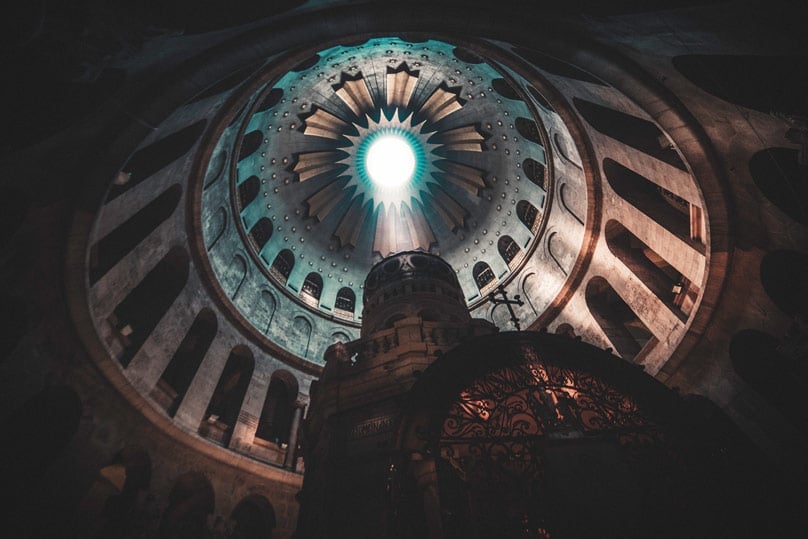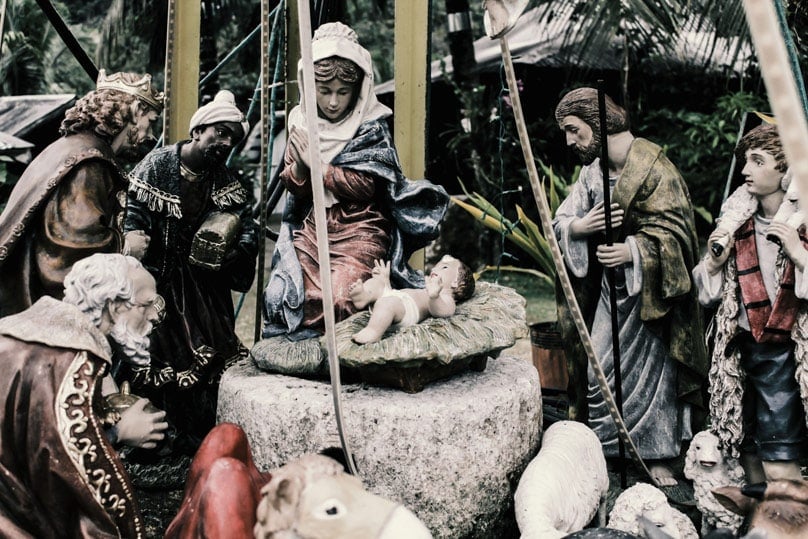
Last time, in this space, we chronicled the confusion of my friend, who discovered that the prophet Isaiah did not write “Behold, the virgin shall conceive” in Isaiah 7:14, but “Behold, the almah shall conceive”. Almah, as we saw last time, means “young woman” (an idea that certainly can encompass a virgin, but which need not be limited to that). We saw that it was Jews a couple centuries before Jesus who translated the Hebrew almah into the Greek parthenos (virgin) and thereby provided Matthew with the passage he quotes in his gospel (Matthew 1:23). We also saw that this passage from Isaiah is not the source of the tradition that Jesus was born of a virgin, but rather that this Tradition can have only one possible source: the Blessed Virgin herself.
So the question arises: why does Matthew bother quoting this passage from Isaiah at all?
The answer takes us far into Israel’s past and into a way of reading Scripture that is both deeply Jewish and deeply Christian.
First, an important rule of thumb about the New Testament.
When a New Testament writer quotes a passage from the Old Testament, he is assuming you know the Old Testament as well as a modern teenager knows the scripts to all the Star Wars movies.
My oldest son is named Luke. When his friends are visiting I will sometimes walk into the room, breathing heavily, and point at him saying, “Luke! I am your father.” I don’t need to laboriously explain to everybody the context of my remark. Everybody in the room instantly recalls the scene from The Empire Strikes Back and can, indeed, tell you the whole story of Anakin Skywalker’s humble origins, rise, fall, and redemption. What I am doing in quoting that line is alluding to all of that and making a joke that everyone will get.
We can make use of allusion in all sorts of ways other than jokes. If I say of some cutback to medical care for the poor “If the poor be like to die they had better do it and help decrease the surplus population”, I need not elaborately explain the whole tale of Ebenezer Scrooge. Most literate people will understand the reference.
 Matthew is doing the same thing. He expects us to understand the entire context of Isaiah 7:14 and not simply read it in isolation. So what is that context?
Matthew is doing the same thing. He expects us to understand the entire context of Isaiah 7:14 and not simply read it in isolation. So what is that context?
To find that out, we must go back in time a thousand years before Christ to a moment that is the source of the entire Jewish messianic tradition. David has recently become king and is thinking about the Ark of the Covenant still being housed in the tent Israel used for it during the centuries in which they first wandered in the wilderness and eventually conquered and settled in the Holy Land. He goes to Nathan the prophet and says, “See now, I dwell in a house of cedar, but the ark of God dwells in a tent.” (2 Samuel 7:2). So he proposes to build a “house” (i.e., a temple) for God to replace the tent. But Nathan, after consulting God, returns with God’s reply:
“Would you build me a house to dwell in? I have not dwelt in a house since the day I brought up the sons of Israel from Egypt to this day, but I have been moving about in a tent for my dwelling. In all places where I have moved with all the sons of Israel, did I speak a word with any of the judges of Israel, whom I commanded to shepherd my people Israel, saying, “Why have you not built me a house of cedar?” ’ Now therefore thus you shall say to my servant David, ‘Thus says the Lord of hosts, I took you from the pasture, from following the sheep, that you should be prince over my people Israel; and I have been with you wherever you went, and have cut off all your enemies from before you; and I will make for you a great name, like the name of the great ones of the earth. And I will appoint a place for my people Israel, and will plant them, that they may dwell in their own place, and be disturbed no more; and violent men shall afflict them no more, as formerly, from the time that I appointed judges over my people Israel; and I will give you rest from all your enemies. Moreover the Lord declares to you that the Lord will make you a house. When your days are fulfilled and you lie down with your fathers, I will raise up your offspring after you, who shall come forth from your body, and I will establish his kingdom. He shall build a house for my name, and I will establish the throne of his kingdom for ever. I will be his father, and he shall be my son. When he commits iniquity, I will chasten him with the rod of men, with the stripes of the sons of men; but I will not take my merciful love from him, as I took it from Saul, whom I put away from before you. And your house and your kingdom shall be made sure for ever before me; your throne shall be established for ever.’ ” (2 Samuel 7:5–16)
There is a pun at the root of this exchange. Instead of David building a “house” in the form fo a temple for God, God will build David a “house” in the form of a dynasty: the House of David. This is the origin of the Israelite conviction that the “Son of David” would rule over Israel forever and that God is with (Emmanuel) the House of David forever.
So we now fast forward from the time of David to the time of Isaiah (about three hundred years). There’s been a lot of historical water under the bridge. Since David’s day, there has been a civil war that split most of Israel from the House of David. His family now rules over a small rump kingdom called Judah while ten tribes have apostatized from God and from loyalty to David’s heirs. Moreover, David’s heirs are not all winners. During Isaiah’s day, the king is Ahaz and he is not much of a prize. Worse still, Judah is now threatened with invasion by Syria and Israel. If it succeeds, the House of David is doomed and the promises of God to David’s house will, it would seem, be ended.
In this hour of national crisis, Isaiah goes to Ahaz and tells him, “Ask a sign of the Lord your God; let it be deep as Sheol or high as heaven” (Isaiah 7:11). Ahaz, pretending piety but really hoping for salvation via the horses and chariots of Egypt, replies to Isaiah, “I will not ask, and I will not put the Lord to the test” (Isaiah 7:12).
It is then that God speaks to Ahaz in the famous words to which Matthew will later allude:
Hear then, O house of David! Is it too little for you to weary men, that you weary my God also? Therefore the Lord himself will give you a sign. Behold, an almah shall conceive and bear a son, and shall call his name Immanu-el. He shall eat curds and honey when he knows how to refuse the evil and choose the good. For before the child knows how to refuse the evil and choose the good, the land before whose two kings you are in dread will be deserted. The Lord will bring upon you and upon your people and upon your father’s house such days as have not come since the day that Ephraim departed from Judah—the king of Assyria. (Isaiah 7:13-17)
So who is the almah?
Well, in the original context, the almah is Ahaz’ wife, a young woman who will conceive and bear Ahaz’ son, Hezekiah. And Hezekiah will himself be the sign that God is still with the House of David and causing it to carry on into the future where it will outlive the threat from Syria and Israel–in a word, that the promise to David will not fail and there will always be an heir to David to succeed him forever.
But here’s the thing: politically speaking, the House of David does in fact fail. Judah is eventually conquered by Babylon, the king of Judah is deported along with his sons, blinded, and left to die in a foreign land. It appears that, at long last, the promise does fail.
And yet the same prophets who warn that destruction is coming for the house of David also promise that the now-chopped-down “stump of Jesse” (David’s father) will put forth a “Branch” and restore the Davidic kingdom;
There shall come forth a shoot from the stump of Jesse,
and a branch shall grow out of his roots.
And the Spirit of the Lord shall rest upon him,
the spirit of wisdom and understanding,
the spirit of counsel and might,
the spirit of knowledge and the fear of the Lord.
And his delight shall be in the fear of the Lord.
He shall not judge by what his eyes see,
or decide by what his ears hear;
but with righteousness he shall judge the poor,
and decide with equity for the meek of the earth;
and he shall strike the earth with the rod of his mouth,
and with the breath of his lips he shall slay the wicked.
Righteousness shall be the belt of his waist,
and faithfulness the belt of his loins.
The wolf shall dwell with the lamb,
and the leopard shall lie down with the kid,
and the calf and the lion and the fatling together,
and a little child shall lead them.
The cow and the bear shall feed;
their young shall lie down together;
and the lion shall eat straw like the ox.
The sucking child shall play over the hole of the asp,
and the weaned child shall put his hand on the adder’s den.
They shall not hurt or destroy
in all my holy mountain;
for the earth shall be full of the knowledge of the Lord
as the waters cover the sea. (Isaiah 11;1-9)
It is this “Branch” (also known as the Anointed One, Messiah, Servant of the Lord, Son of David and various other titles) that the Jews of Matthew’s time are looking for. And when he comes and, in various ways, fulfills the Old Testament–most of all by dying and rising from the dead–he tells the Church:
Thus it is written, that the Christ should suffer and on the third day rise from the dead, and that repentance and forgiveness of sins should be preached in his name to all nations, beginning from Jerusalem. You are witnesses of these things. (Luke 24:46-48)
In other words, as Augustine put it, the New Testament is hidden in the Old and the Old Testament is only fully revealed in the New. Hezekiah, born of the almah or young woman is a type or shadow of the ultimate Son of David born of another kind of almah: the Virgin Mary. Matthew then naturally alludes to that foreshadowing son of David in Isaiah and the prophecy of his birth because Jesus, the final Son of David is the natural fulfilment of the sign who was Hezekiah. God has kept his promise to David and now the Son of David reigns for all of time and eternity at the right hand of God the Father.
